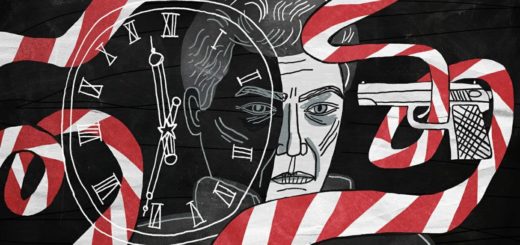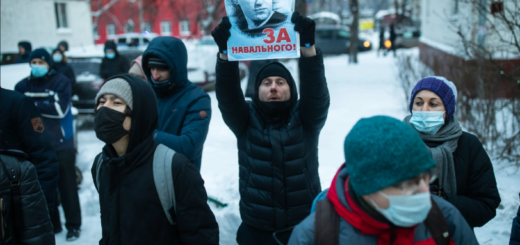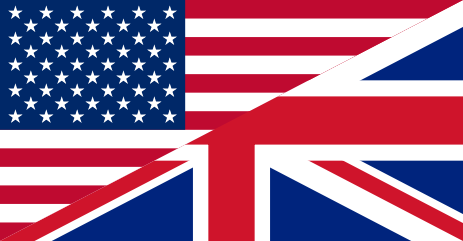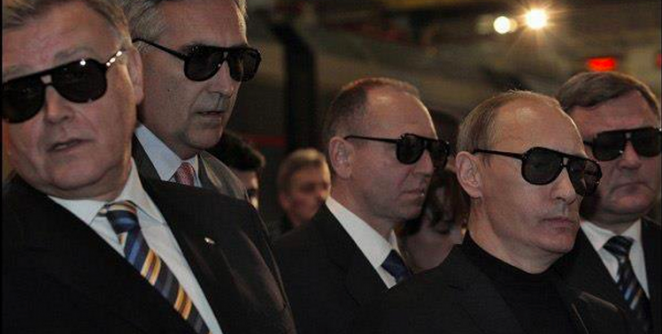The labels game: how Ukrainians are sold the “Russian” Inkerman and how the EU sanctions are related to this
After the annexation of Crimea, the famous “Inkerman Fine Wine Factory” was divided into Ukrainian and “Russian” parts. Wine for export to Russia is bottled at a factory in Sevastopol, and in mainland Ukraine, wine with the same brand name of Inkerman is produced – but it’s bottled at a factory in Novaya Kakhovka. As Current time and “Municipal Scanner” found out, behind both wineries is a Swedish company that has been operating for almost five years, violating the EU sanctions.
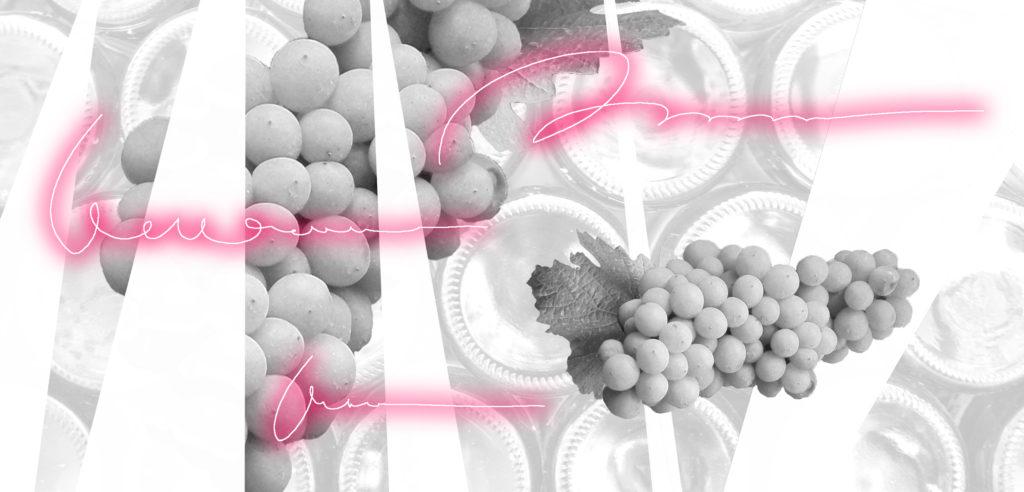
When in the spring of 2019 a CT correspondent went to the Inkerman section of the webpage of the Ukrainian online store of the METRO supermarket chain, the first wine to appear was “Bastardo. Old Crimea”. If you carefully examined the label, you could see that the wine was produced in Sevastopol, despite the fact that any export from Crimea is prohibited by the Ukrainian law.
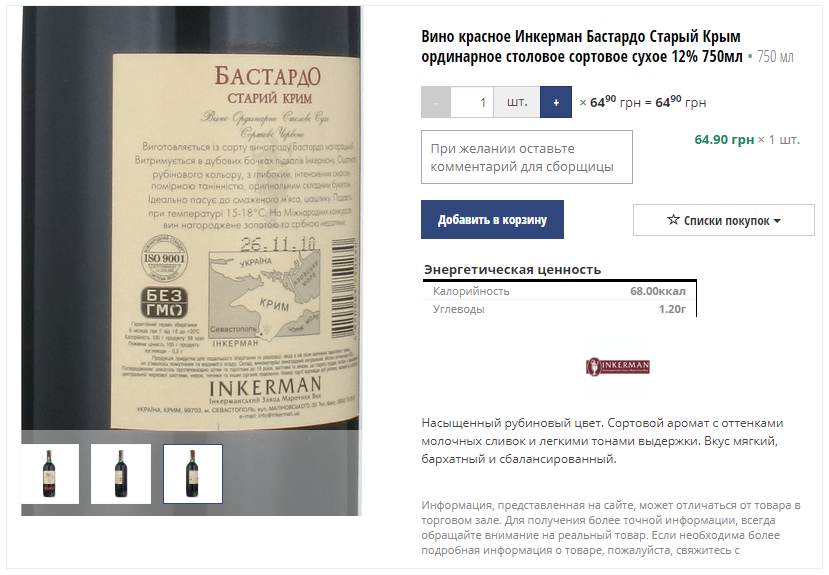
When the Current Time correspondent turned to the store with a question about the origin of the wine, they answered that it was bottled in Novaya Kakhovka, and there was apparently a mistake on the label.
“This may be the legal address, but it’s bottled in Kakhovka, Kherson oblast”, – the METRO customer support service replied.
So, when ordering a bottle with a label suggesting it was produced in Crimea from the website, the buyer may get the wine bottled in Novaya Kakhovka. Soon after the conversation with the correspondent, photos with labels showing the ingredients and the manufacturer disappeared from the Ukrainian METRO online store.
The same “Bastardo. Old Crimea” is also on the website of the Russian w!nestyle store chain. The label is the same as on the wine in the Ukrainian METRO, with inscriptions in Ukrainian. The store support service claims that the wine was produced in Crimea.
“This could be a marketing ploy. In principle, we have very little wine from Ukraine… Mainland Ukraine, that is. All of it is Crimean”,- the w! Nestyle support service replied.
Two “Inkerman”s
After the annexation of Crimea, one of the largest Ukrainian wine producers, “Inkerman fine wine plant”, was divided into Ukrainian and “Russian” parts.
The latter retained a factory in Sevastopol, which is registered in the Russian registry of legal entities and exports wine to Russia. They came up with a special designation for the origin of the product – “wine with a protected geographical indication «Crimea»”.
In mainland Ukraine, they decided to produce their own wine under the same Inkerman brand at the plant in New Kakhovka.
Behind both wineries is the Swedish company Inkerman Interrnational, which is headed by Ukrainian millionaire Valery Shamotiy (as of May 2019, he is chairman of the company). Current Time and “Municipal Scanner” found out that the Swedish company runs the risk of falling under the EU sanctions adopted in July 2014, which prohibit any export from Crimea.
Deep traditions
Depth – from 5 to 30 meters, area – 50 thousand square meters. A unique underground city, one of the largest in Europe, was formed on the site of the quarries in Inkerman, five kilometers from Sevastopol. After World War II, building materials were mined here for the restoration of the hero city, and in 1961 it was decided to establish a winery here. The constant temperature and humidity are ideal for storing wine products. Soon, “Inkerman Fine Wine Factory” became the leader in Ukrainian wine production.
On the eve of the annexation of Crimea, the Inkerman group of companies included “Inkerman Fine Wine Factory” itself and two agricultural enterprises: OOO “Kachinsky +” and AO “Agrofirma Chernomorets”. Already back then, their owner was the Swedish company Inkerman International AB, which was founded and headed by one of the richest businessmen in Ukraine, the Dnipro entrepreneur Valery Shamotiy. In 2013, Forbes magazine estimated Shamotiy’s assets at almost $ 75 million and put him in 99th place in the ranking of the richest people in Ukraine.
At the end of 2014, all enterprises of the plant were re-registered in the Russian Federation. OOO “Kachinsky +” from the Inkerman group was also registered in the Russian Unified State Register of Legal Entities on November 11, 2014. 75% of the company belongs to the Swedish Inkerman International, 12.5% to the director Mikhail Efimovich Khosh, 12.5% to Vitaly Alexandrovich Koshelev.

At the same time, in 2014, two new enterprises were created: OOO “Inkerman Wine House” in Moscow and OOO “Inkerman Trading House” in Kiev. The latter changed its name to OOO “Inkerman Ukraine” in 2018.
The owner of the Ukrainian and Russian companies is the same Swedish Inkerman International. Its owners today are the Cypriot company Eksen Investments, the Finnish HTT BWH Holding and the Hong Kong-based Pan Chang Group. Until 2016, Natalia Yaresko was one of the owners of Inkerman International through a Cypriot and an American company. In 2014-2016, she was the head of the Ministry of Finance of Ukraine.
According to the data from October 2019, the owner of “Inkerman Fine Wine Factory”, OOO “Kachinsky +” and “Inkerman Wine House” is AO “Optima” registered in St. Petersburg. “Optima”, in turn, belongs to the Crimean winemaker Valery Zakharyin. He confirmed the purchase of Inkerman in October of this year in an interview with the Russian newspaper Vedomosti.
“The relationships are purely historical”
As Anna Gorkun, the director of Inkerman Ukraine, told in an interview with Current Time, her company does not cooperate with the Crimean Inkerman.
“We have not had any financial or economic relations for a very long time”, –Gorkun says. – “They most likely remained purely historical. In the year when the annexation began, part of the Inkerman team decided for itself to leave Crimea, for personal reasons, to start working on the mainland. Thus, the “Inkerman Ukraine” founded [in Ukraine] did not cease to exist in terms of winemaking traditions and technologies. We have preserved the so-called continuity”, – said Gorkun.
According to her, all products are produced on the territory of mainland Ukraine: at the “Tavria Fine Cognac House” in Novaya Kakhovka, Kherson oblast, at the “Vintrest” enterprise in the Odessa oblast, and Inkerman sparkling wines were produced at Odessavinprom even before the annexation. Grapes, according to Inkerman-Ukraine, are purchased mainly in the Odessa region, a little in Kherson and Mikolayiv, and even less abroad for a limited edition of elite wines. The director of the company says that due to the lack of Crimean grapes, they had to reduce the number of wines.
“If we cannot repeat something in the quality that the buyer will expect, then we will not be dishonored, we need to keep the bar of quality and image with dignity and not defile the name of a brand that is almost 60 years old”, – says Gorkun.
“Inkerman”s have also divided the markets. Wine from New Kakhovka is sold in Ukraine; it was shipped in several batches to Canada, Switzerland, Germany and Israel. The director says that they are open for cooperation with Europe, America and China, but not with Russia. There and on the Crimean peninsula, the wine produced near Sevastopol is sold.
Export and sanctions
If we go back to the bottle of red “Bastardo. Old Crimea”, its presence in the Ukrainian METRO with the Sevastopol label violates the Ukrainian law, and the presence in Moscow w!nestyle – the European sanctions. In July 2014, EU countries approved the sanctions that prohibit any import or export of Crimean goods.
According to the director of Inkerman Ukraine Anna Gorkun, the Crimean Inkerman does not violate the sanction ban, since it acts in accordance with the Russian law, and it does not consider the delivery of goods from Crimea as export.
“From the point of view of the Russian and Ukrainian legislation, the factories that produce wine in Crimea do not enter into foreign economic relations with the Russian contract partners. For them, this is a domestic market, this is not a foreign market”, –she says.
Each EU country, according to the decision of the European Commission, must independently monitor compliance with sanctions. Current Time has not been able to find out whether Sweden considers the supply of wine from annexed Crimea to Russia as export, and the ownership of assets on the peninsula as a violation of sanctions. In response to our request, the Ministry of Foreign Affairs, which is responsible for sanctions, advised us to contact the prosecutor’s office and the Ministry of Finance. But these departments refused to answer questions about Inkerman International and assured that the Ministry of Foreign Affairs was in charge of the sanctions.
The Management of the Crimean Inkerman refused to comment. “I will not answer anything to your questions, I’m not ready to give an interview. Let’s get back to this issue in a month”, –Larisa Shimchuk, current director of OOO “Inkerman Fine Wine Factory”, told Current Time in the end of March.
Shimchuk took up the position recently – this February. One of her predecessors, Sergey Lebedev, who managed the company until December 2018, often gave interviews. In one of them, in 2017, he told the RNS news agency that the Crimean Inkerman exported wine not only within Russia, but also to China, Belarus, Kazakhstan and Kyrgyzstan. The way to Europe was closed.
“We are ready, but this is a question for the politicians. It all depends on when they decide what Crimea is and where the sanctions end”, – said Lebedev.
In April 2017, the Crimean plant was involved in a scandal at a wine exhibition in Italy. Ukrainian participants of the event complained to the police when they saw Inkerman products at the Russian stand. Crimean winemakers had to remove their goods.
In addition to violations of export rules, the Crimean plant collaborated with a bank that is directly subject to EU and US sanctions. Twice in 2016 and six times in 2017, OOO “Inkerman Fine Wine Factory” received loans from Russian National Commercial Bank on the security of production equipment and wine materials.
Another company of the Inkerman group – the Russian “Kachinsky +” – supplied wine materials three times (in 2017, 2016 and 2015) to state enterprises for a total of 55.5 million rubles ($800 thousand) under government contracts.
Whose factory is it?
Before the annexation of 2014, almost all of the buildings and 20% of Inkerman equipment belonged to the State Property Fund of Ukraine. As the former director of “Inkerman Fine Wine Factory” Sergey Lebedev told in an interview, in 2014 the new authorities tried to nationalize the enterprise, refusing to sign lease agreements. In 2014, the issue of rent was resolved, but since 2015, officials again refused to sign the document.
A similar situation has developed with the “Kachinsky +” state farm, where products for the winery are grown. The land lease agreement with the holding ended in December 2014.
At the end of 2018, the Russian Sevastopol Arbitration Court ordered OOO “Inkerman Fine Wine Factory” to return the leased part of the property to the city. Representatives of the factory stated that they could not continue their activities without this property, and accused the city authorities of putting pressure on the enterprise.
The conflict heated up amid talk of attracting a new Russian investor. According to “Krim. Realii”, there plans to sell the plant to the “Southern Project” company, which previously acquired the famous Crimean winery “Novyi svet” and belongs to the “Russia” bank. The website calls the shareholders of “Southern Project” friends of Russian President Vladimir Putin.
At the time of publication of the article, the ownership structure of “Inkerman Fine Wine Factory” did not change, and the results of the appeal in the case of the severance of the lease agreement between the city authorities and the enterprise was not known.
